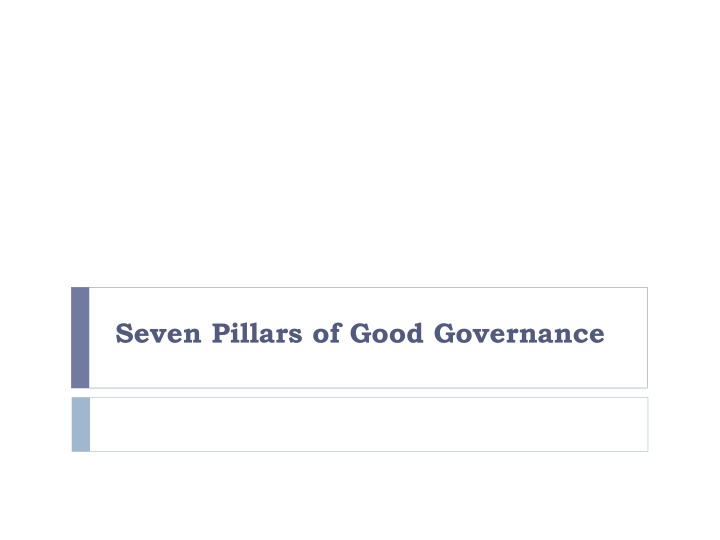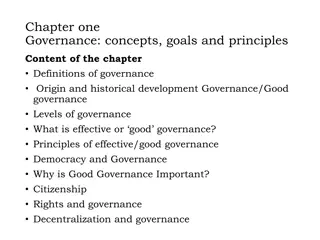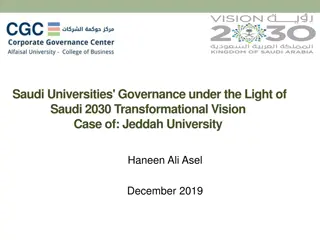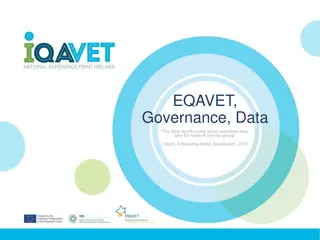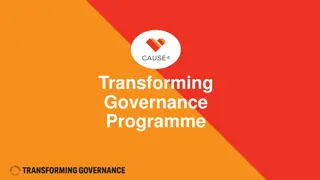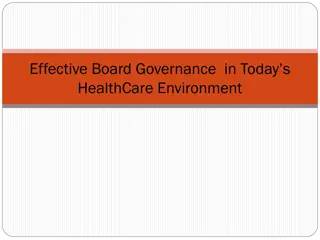Seven Pillars of Good Governance: Key Principles for Effective Leadership
Governance involves the dynamic interaction between people, structures, processes, and traditions to uphold legitimate authority for sound leadership, oversight, and control. The seven pillars of good governance include legitimacy, participation, responsible stewardship, ethical conduct, transparency, and predictability, emphasizing accountability, integrity, and efficiency for organizations.
Download Presentation

Please find below an Image/Link to download the presentation.
The content on the website is provided AS IS for your information and personal use only. It may not be sold, licensed, or shared on other websites without obtaining consent from the author.If you encounter any issues during the download, it is possible that the publisher has removed the file from their server.
You are allowed to download the files provided on this website for personal or commercial use, subject to the condition that they are used lawfully. All files are the property of their respective owners.
The content on the website is provided AS IS for your information and personal use only. It may not be sold, licensed, or shared on other websites without obtaining consent from the author.
E N D
Presentation Transcript
What is Governance. Governance is defined here as the dynamic interaction between people, structures, processes and traditions that support the exercise of legitimate authority in provision of sound leadership, direction, oversight, and control of an entity in order to ensure that its purpose is achieved, and that there is proper accounting for the conduct of its affairs, the use of its resources, and the results of its activities.
Seven pillars of Good Governance Seven generally accepted, interrelated pillars of democratic, and consequentially "good," governance follow: 1. Legitimacy is grounded in constitutional documents and incorporation instruments, "rule of law," respect for traditions, and credibility with key stake/shareholders who "freely" consent to the authority of the governing body. 2. Participation (or engagement) is the involvement of electors, shareholders, members and other key stakeholders in planning, decision processes, and evaluation. This allows a governing body to obtain reliable information, serves as a reality check and watchdog, spurs operational efficiency, and provides feedback by users of public services necessary for monitoring access to, and quality of services. And it clearly defines the lines of accountability.
Continued. 3.Responsible Stewardship is faithful exercise of the duties of due care, diligence, and loyalty in the efficient use of financial and human resources allocated to the purposes for which they were entrusted. 4.Ethical Conduct includes respect, honesty, openness, integrity, trustworthiness and fairness in all interactions; commitment to the spirit as well as the letter of laws, rules, regulations, norms and traditions; service to the benefit of primary beneficiaries above service to self; and leadership by example.
Continued 5.Transparency requires timely access by electors, shareholders, members, and other key stakeholders to low-cost, relevant, reliable information about finances, products or services, management of resources, and decision processes. Transparent procedures in organizations may include open meetings, accurate disclosure of financial and other critical performance indicators, compliance with freedom of information legislation, and ready accessibility of annual reports and audited financial statements.
Continued 6.Predictability refers to the conduct or actions of elected officials/board members and appointed staff. Predictability results primarily from laws, regulations and role definitions that are clear, and known in advance; are fair; and uniformly and effectively enforced. It is essential to stakeholder confidence and public trust that stewardship and fiduciary responsibilities will be properly exercised, that business will be conducted ethically and that projected results are realistic.
Continued 7.Accountability is the capacity of electors, shareholders, and organizational members to call decision-makers to account for their actions. Effective accountability has two components: "answerability" and "consequences." The first is the requirement to respond periodically to questions concerning one's official actions. The second is the need for the acknowledgement of achievements or shortcomings, rewards for achievements, and the application of deterrent sanctions for breach of rules or serious deficiencies in performance.
What are these 7 institutions and how can they make the difference? The Parliamentary Committees State Bank of Pakistan Auditor General of Pakistan Pakistan Revenue Service Federal/Provincial Public Service Commission Federal/Provincial Ombudsman Federal Election Commission 1. 2. 3. 4. 5. 6. 7.
Parliamentary Committees The Parliamentary committees particularly the Public Accounts Committee. Bipartisan committees chaired by respected and qualified MNAs or Senators and staffed by full-time professional and technical personnel should hold regular hearings, confirm the appointments of those heading these institutions, receive annual reports of performance, question the reported irregularities and recommend action against those found prima facie responsible for wrong doings. All procurement contracts above a certain financial limit, all fiscal exemptions and concessions, modifications to the SROs should be placed before the PAC. The proceedings of these Committees should be open to public and the media. The temptation for the members of these committees to harass the concerned officials or get involved in micro-management is very strong under the political culture of Pakistan. If this happens these committees will be more of a trouble than an agent of good governance.
State Bank of Pakistan An independent and autonomous State Bank provides a guarantee against the excessive and irresponsible actions of the politicians and the bureaucrats in economic management. The federal and provincial governments will be guarded in their spending decisions if the State Bank refuses to honor their cheques beyond the given Ways and Means limits. At the same time the regulatory and supervision functions of the State Bank act as a safeguard against the possible malpractices in the award of credit and recovery of loans. It must be recognized that there has already been significant improvement in the working of the State Bank since it was granted autonomy
Auditor General of Pakistan The constitutional protection given to the office of the AG has not been fully utilized in Pakistan to unearth and detect financial bungling rampant in the public sector agencies. The extended time laps between the occurrence of the financial irregularity and the actual detection and reporting by the auditors, the lack of professional expertise and lack of prioritization among core and peripheral cases have muted the efficacy of this office. The AG should commission third party audits by professional firms of repute, use the broader 'value for money' concept and enlarge its scope of activities to cover all major public sector commercial and industrial enterprises
Pakistan Revenue Service Tax collection in Pakistan has caused a lot of grief to the economic managers in pursuing a prudent fiscal policy. The renaming of the Central Board of Revenue will be purely cosmetic unless there is major reorientation and restructuring of the incentives, pay, recruitment, promotion, training, performance evaluation, procedures and processes. The new goal-oriented, result-based organization can generate higher tax yields if the basic compensation package and reward structure for the tax officials are such as to inhibit temptations for side deals with corrupt tax payers. At the same time there should be enough flexibility to penalize those who continue to indulge in these deals.
Federal/Provincial Public Service Commission Most of the current difficulties in governance have arisen due to the politicization of the higher services in the post-1973 period. There is a general recognition that the merit-based system of recruitment, appointments and promotions, despite many shortcomings had served the nation better than the present sifarish based and buy-the-post system. The responsibilities for all recruitment and promotions should be reverted to the Commissions without any exception but only men and women of proven integrity and faultless credentials should be appointed as chairman and members of the Commission. There is no harm in appointing retired officials or judges but these appointments should not be a reward for loyalty to the party in power or for favors shown to the authorities. The Police Commissions should also be set up on the same lines.
Federal/Provincial Ombudsman The fanfare with which these offices were established under the Zia government died down fairly quickly. They are now perceived to be grinding the same millstone as the rest of the bureaucracy. In fact, they can become an effective instrument for quick, fair and judicious redress of the grievances of the common citizens against the arbitrary harassment of the overzealous or corrupt officials. There are very few people who are aware of the scope and mandate of this office and who have trust in the organization. A proactive educational role, a demonstration effect of its reach accompanied by selection of the right persons to the job can make it work
Federal Election Commission A powerful, independent and assertive FEC can play a preventive role by careful screening, scrutiny and investigation of the candidates for all tiers of elected offices and disqualifying those who are ill-reputed and of dubious character. They should forcefully enforce the criteria prescribed under the Constitution augmented by appropriate rules and regulations. This fundamental shift in the quality of our elected public officials would bring about a significant change in the overall structure of governance in the country
